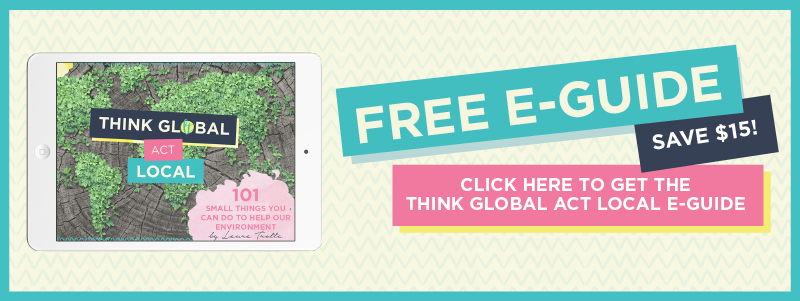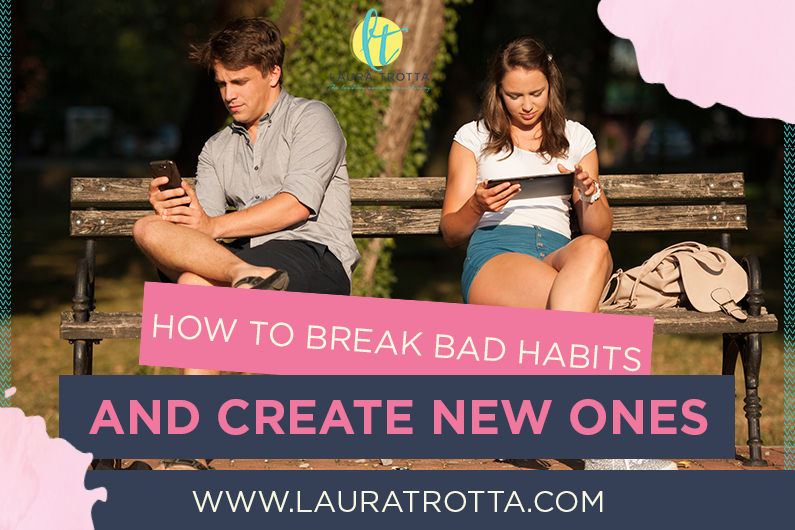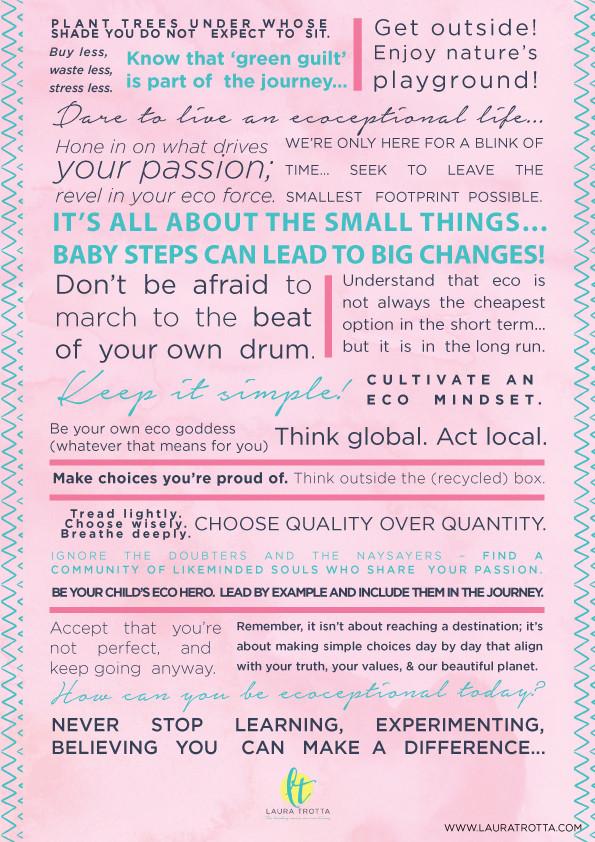If you’re wanting to live a more self-sufficient, sustainable lifestyle, it’s likely you’ll need to break some old, bad habits and replace them with new, sustainable living habits.
But how do you break a bad habit?
In this post I’ll explain why bad habits are typically hard to break. I’ll also share some tips on how you can replace an old habit with a new one.
Podcast: Play in new window
What Is a Habit?
Habits, by definition are a settled or regular tendency or practice, and tend to be hard to give up by nature.
It seems that old habits die hard, after all!
It goes without saying that many of our habits are good for us. A habit like going for a daily walk improves our physical, mental and emotional health.
Bad habits, on the other hand, get in the way of us accomplishing our goals. They can impact our physical, mental and emotional health, and waste our time and energy.
Why Is It Hard To Break A Habit?
Even when we’re conscious that our habits aren’t great for us, we can find them so hard to break. This is because habits, even bad ones, provide some type of benefit in our lives.
Take your social media habit for example……
Social media helps us feel connected to others, alleviates boredom, educates us on new trends and topics, and can provide us with a laugh.
Yet globally, we’re spending just under an hour a day on Facebook Apps alone (i.e. Facebook, Messenger and Instagram) source. That’s 7 hours a week and 365 hours a year, which is the equivalent of 152 days (and nights!) spent on Facebook in a 10 year period!!!
We tend to check in on social media first thing in the morning, last thing before going to sleep at night, while on public transport, in the doctor’s waiting room, on the toilet even… basically whenever we have a spare moment or are looking to procrastinate from another task. So many of us just keep the browser permanently open throughout our working day too, dipping in and out when we feel like it.
It’s not surprising that many people find social media addictive (it’s designed to be addictive, by the way!) and that it’s killed their productivity. Others find the act of constantly trawling through their newsfeed and seeing the highlight reel of their friends and acquaintances lives, dishes up a decent dose of comparison-itis… which isn’t great for mental or emotional health.
So you can see that even when so many of us recognise that we need, and want, to reduce our time on social media apps, we find it hard to do.
How To Replace An Old Habit With a New Habit
Shifting to a more sustainable, self-sufficient lifestyle will involve you replacing a number of old habits with new, sustainable living habits.
It’s worth noting that it’s not about eliminating bad habits, it’s about replacing them with habits that are more beneficial to you.
Here’s a few actions that you can take to increase your chances of successfully replacing old habits with a new ones…..
Five Tips To Create New Sustainable Living Habits
1. Surround Yourself With People Who Live The Way You Want To Live
Jim Rohn famously said “You’re the average of the five closest people you spend the most time with.”
This goes to say that if you’re hanging out with friends who love consuming, it will be harder for you to live a more sustainable lifestyle than if you were spending your time with friends who were conscious consumers.
Surrounding yourself with people just a few steps ahead of you on the journey is just as effective in an online environment as it is face to face. So if you can’t find people in your local area on the same page as you, reach out and find an online community.
I recently polled my Self Sufficiency in the Suburbs members about why they joined, and most of them listed that they wanted to be in a community of like-minded women all supporting each other to live more sustainably. They realize the importance of surrounding themselves with people who live the way they want to live when trying to create new sustainable living habits. It’s invaluable!
2. Get an Accountabilibuddy
Enlisting an accountabilibuddy is just as powerful as surrounding yourself with people who live the way you want to live.
An accountabilibuddy helps hold you accountable and helps you celebrate your wins, however small. Knowing that someone else is there to support you to achieve your goals is a powerful motivator.
3. Visualize Yourself Succeeding
I’m a big believer in the power of visualizing your ideal lifestyle. Whatever the habit is that’s getting in the way, visualize yourself moving on, enjoying your changes, and embracing the new you.
For example, close your eyes and see yourself with your phone switched off or on silent, outside with your kids planting some new seedlings that will grow into tasty vegetables in a number of weeks. See yourself with a rubbish bin with barely any waste in it every week. With a freezer full of healthy, home cooked meals you can simply reheat on those evenings when you just don’t have the energy to cook.
These images will all motivate you to stay on track.
4. Overcome Negative Self Talk
We’re so quick to judge ourselves whenever we stumble or make a mistake. Indeed, we’re our own harshest critics!
I see this inside my eco-living programs when students share their progress.
Comments like “I did well here, but failed here” or “I’m so behind!” show a glimpse of the kind of stuff we tell ourselves day in and day out.
Negative self-talk is not only self-depreciating, it’s really destructive and is the fastest way to slip back into bad habits.
During those times when you don’t seem to be winning, make an effort to talk to yourself like you would your best friend.
Would you’re best friend say “Gee, you’re hopeless at this gardening gig. Look all your seedlings have died. Why are you wasting your time?” Or would they say “So your seedlings died? Big deal? It’s awesome that you’re learning a new skill. I’m sure your next batch will do better!”
You get the idea… be kind to yourself and don’t listen to the mean bitch inside your head.
5. Appreciate The Power Of One
Just One Day.
When you think of making a change for just one day, it doesn’t seem as overwhelming does it?
Try something for just one day. And then do it for one more day.
Taking it one day at a time is a great way to go when you’re creating new habits.
The power of one even extends past one day. You can even focus on just one thing.
Plant one thing in the garden. Just one plant. See how it goes. Then plant one new thing.
Replace one processed food you usually buy with one you’ll make yourself. Don’t start out by replacing the entire pantry! Tackle one processed food at a time. Start with stock, then gravy powder, then tomato sauce or whatever ……
6. Get Back On The Horse
Lastly, when slip ups do happen, and they will, recognise you’re human. Get back on the horse and try again. If you’re having trouble dusting yourself off, go back to step 1 and lean in to your like-minded tribe for support.
Adopting a more self-sufficient, sustainable lifestyle, will require you to continually replace old habits with new, sustainable living habits. By finding your like-minded tribe, visualizing your success, overcoming negative self talk, appreciating the power of one, and getting back on the horse when you fall off, you’ll be well on your way to creating an ecoceptional life you love and of course, making green mainstream.
For some extra tips to help you along the way, download your FREE copy of my “Think Global Act Local” eguide here (save $15). This guide contains 101 small things you can do to help the environment (and save cash, improve your health along the way!).

Ready to take the next step towards an ecoceptional life? What one habit will you replace next? Share below!
Podcast: Play in new window | Download
- Sustainable Home Design- factors to consider to maximise sustainability - July 28, 2022
- Advantage and Disadvantages of Tiny Houses - May 31, 2022
- How School Strike 4 Climate is Empowering Youth to Fight for Their Future - May 1, 2022


 Laura Trotta is one of Australia’s leading home sustainability experts. She has a Bachelor of Environmental Engineering, a Masters of Science (in Environmental Chemistry) and spent 11 years working as an environmental professional before creating her first online eco business, Sustainababy, in 2009. She has won numerous regional and national awards for her fresh and inspiring take on living an ‘ecoceptional’ life (including most recently winning the Brand South Australia Flinders University Education Award (2015) for the north-west region in SA and silver in the Eco-friendly category of the 2015 Ausmumpreneur Awards). With a regular segment on ABC Radio and with her work featured in publications like Nurture Parenting and My Child Magazine, Laura is an eco thought leader who’s not afraid to challenge the status quo. A passionate believer in addressing the small things to achieve big change, and protecting the planet in practical ways, Laura lives with her husband and two sons in outback South Australia.
Laura Trotta is one of Australia’s leading home sustainability experts. She has a Bachelor of Environmental Engineering, a Masters of Science (in Environmental Chemistry) and spent 11 years working as an environmental professional before creating her first online eco business, Sustainababy, in 2009. She has won numerous regional and national awards for her fresh and inspiring take on living an ‘ecoceptional’ life (including most recently winning the Brand South Australia Flinders University Education Award (2015) for the north-west region in SA and silver in the Eco-friendly category of the 2015 Ausmumpreneur Awards). With a regular segment on ABC Radio and with her work featured in publications like Nurture Parenting and My Child Magazine, Laura is an eco thought leader who’s not afraid to challenge the status quo. A passionate believer in addressing the small things to achieve big change, and protecting the planet in practical ways, Laura lives with her husband and two sons in outback South Australia. 


